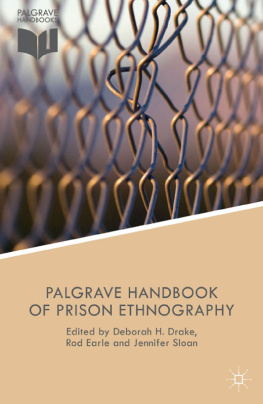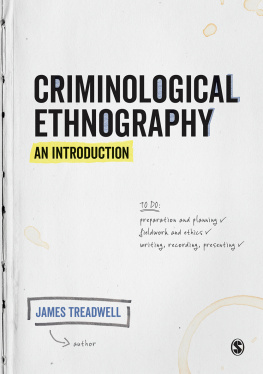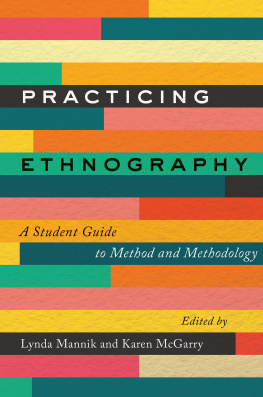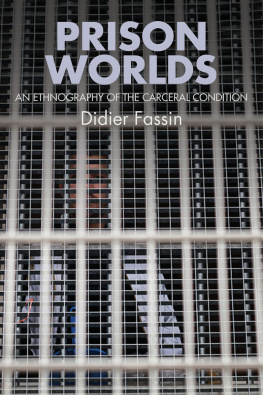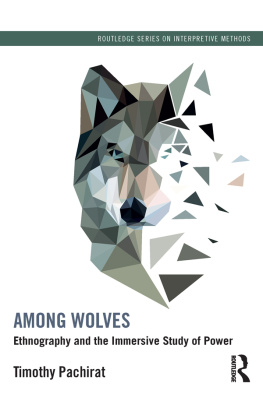The Palgrave Handbook of Prison Ethnography
Palgrave Studies in Prisons and Penology
This is a unique and innovative series, the first of its kind dedicated entirely to prison scholarship. At a historical point in which the prison population has reached an all-time high, the series seeks to analyse the form, nature and consequences of incarceration and related forms of punishment. Palgrave Studies in Prisons and Penology provides an important forum for burgeoning prison research across the world.
Series Editors:
Dr Ben Crewe
Institute of Criminology, University of Cambridge, UK
Professor Yvonne Jewkes
Department of Criminology, Leicester University, UK
Dr Thomas Ugelvik
Associate Professor in the Department of Sociology, Political Science and Community Planning, UiT The Arctic University of Norway, Norway
Series Advisory Board:
Anna Eriksson, Monash University, Australia
Andrew M. Jefferson, Rehabilitation and Research Centre for Torture Victims, Denmark
Shadd Maruna, Queens University Belfast, UK
Jonathon Simon, University of California, Berkeley, USA
Michael Welch, Rutgers University, USA
Titles include:
Vincenzo Ruggiero and Mick Ryan
PUNISHMENT IN EUROPE
A Critical Anatomy of Penal Systems
Phil Scraton and Linda Moore
THE INCARCERATION OF WOMEN
Punishing Bodies, Breaking Spirits
Peter Scharff Smith
WHEN THE INNOCENT ARE PUNISHED
The Children of Imprisoned Parents
Thomas Ugelvik
POWER AND RESISTANCE IN PRISON
Doing Time, Doing Freedom
Marguerite Schinkel
BEING IMPRISONED
Punishment, Adaptation and Desistance
Mark Halsey and Simon Deegan
YOUNG OFFENDERS
Crime, Prison and Struggles for Desistance
Andrew M. Jefferson and Liv S. Gaborit
HUMAN RIGHTS IN PRISONS
Comparing Institutional Encounters in Kosovo, Sierra Leone and the Philippines
Deborah H. Drake, Rod Earle and Jennifer Sloan (editors)
THE PALGRAVE HANDBOOK OF PRISON ETHNOGRAPHY
Palgrave Studies in Prisons and Penology
Series Standing Order ISBN 9781137270900 hardback
(outside North America only)
You can receive future titles in this series as they are published by placing a standing order. Please contact your bookseller or, in case of difficulty, write to us at the address below with your name and address, the title of the series and the ISBNs quoted above.
Customer Services Department, Macmillan Distribution Ltd, Houndmills, Basingstoke, Hampshire RG21 6XS, England
The Palgrave Handbook of Prison Ethnography
Edited by
Deborah H. Drake
Senior Lecturer in Criminology, The Open University, UK
Rod Earle
Lecturer in Youth Justice, The Open University, UK
Jennifer Sloan
Senior Lecturer in Criminology, Sheffield Hallam University, UK


Introduction, selection and editorial matter Deborah H. Drake, Rod Earle and Jennifer Sloan 2015
Individual chapters Respective authors 2015
Foreword Yvonne Jewkes 2015
All rights reserved. No reproduction, copy or transmission of this publication may be made without written permission.
No portion of this publication may be reproduced, copied or transmitted save with written permission or in accordance with the provisions of the Copyright, Designs and Patents Act 1988, or under the terms of any licence permitting limited copying issued by the Copyright Licensing Agency, Saffron House, 610 Kirby Street, London EC1N 8TS.
Any person who does any unauthorized act in relation to this publication may be liable to criminal prosecution and civil claims for damages.
The authors have asserted their rights to be identified as the authors of this work in accordance with the Copyright, Designs and Patents Act 1988.
First published 2015 by
PALGRAVE MACMILLAN
Palgrave Macmillan in the UK is an imprint of Macmillan Publishers Limited, registered in England, company number 785998, of Houndmills, Basingstoke, Hampshire RG21 6XS.
Palgrave Macmillan in the US is a division of St Martins Press LLC, 175 Fifth Avenue, New York, NY 10010.
Palgrave Macmillan is the global academic imprint of the above companies and has companies and representatives throughout the world.
Palgrave and Macmillan are registered trademarks in the United States, the United Kingdom, Europe and other countries.
ISBN 9781137403872
This book is printed on paper suitable for recycling and made from fully managed and sustained forest sources. Logging, pulping and manufacturing processes are expected to conform to the environmental regulations of the country of origin.
A catalogue record for this book is available from the British Library.
A catalog record for this book is available from the Library of Congress.
Contents
Deborah H. Drake, Rod Earle and Jennifer Sloan
Rod Earle
Martyn Hammersley
David Scott
Alison Liebling, Helen Arnold and Christina Straub
Laura Piacentini
Gilles Chantraine and Nicolas Salle
Ben Crewe and Alice Ievins
Jennifer Sloan and Serena Wright
Deborah H. Drake
Andrew M. Jefferson
Elisabeth Fransson and Berit Johnsen
Benita Moolman
James B. Waldram
Rod Earle and Coretta Phillips
Deborah H. Drake
Lorna A. Rhodes
Rod Earle
Jamie Bennett
Lilian Ayete-Nyampong
Lindsay Whetter
Abigail Rowe
Lucy Carr
Joel Harvey
Jennifer Sloan
Thomas Ugelvik
Tomas Max Martin
Mahuya Bandyopadhyay
William Davies
Kristel Beyens and Miranda Boone
Figures
Foreword
What has prison ethnography to offer in an age of mass incarceration?
Being invited to write a Foreword to this groundbreaking collection, following the equally impressive symposium on prison ethnography (Resisting the Eclipse), hosted by The Open Universitys International Centre for Comparative Criminological Research (ICCCR) just over a year earlier, is a great honour. But as I sit down to write a few words that will preface this testament to the importance of ethnographic studies of the prison, I have a slight nagging feeling that the mood of optimism and excitement that marked the conference in September 2013 may have diminished slightly. Many of us work in countries that are experiencing an era of highly politicised penal policy and, relatively rapidly, it seems that doing research in prisons has become a great deal more difficult. The necessary reliance on government agencies to authorise access to prisons, the sometimes tortuous process of liaising with gatekeepers and the intimidation that can be applied by organisations that do not like ones methods or findings have all made the ethnographic endeavour trickier than in previous times. From the perspective of someone working in the UK, it is tempting to rail against the current government and, in particular, at a Secretary of State for Justice who has taken the hardening of penal sensibilities to new levels, made swingeing financial cuts to prison budgets (resulting in many prisons operating with a skeleton staff) and back-pedalled on his predecessors promise of a rehabilitation revolution. In the current climate, many prison governors are understandably reluctant to open their doors to academic researchers. But, equally, these obstacles mean that prison ethnography has never been more necessary.
Next page
